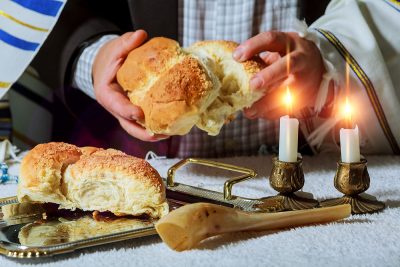×


We have detected your country as:
Please click here to go to the USA website or select another country from the dropdown list.
by: Kate Norman, BFP Staff Writer
“Then God blessed the seventh day and sanctified it, because in it He rested from all His work which God had created and made.” Genesis 2:3
Shabbat. Sabbath. In Israel, it’s as if simply saying the word has a calming effect. It’s a holiday that comes around faithfully every week, as prescribed by God to the ancient Children of Israel in Exodus 20:8–11: “Remember the Sabbath day, to keep it holy. Six days you shall labor and do all your work, but the seventh day is the Sabbath of the LORD your God. In it you shall do no work…For in six days the LORD made the heavens and the earth, the sea, and all that is in them, and rested the seventh day. Therefore the LORD blessed the Sabbath day and hallowed it.” Today, the modern Children of Israel still observe with joy the weekly hallowed rest, beginning at sundown on Friday and ending at sundown the next day, just as the God of their fathers commanded.
 Friday morning and afternoon are a hustle and bustle of activity in Israel as families clean their houses, run last-minute errands and rush to catch the last bus before public transportation shuts down until Saturday night. Walking down the street, through apartment stairwells and past open windows, you can smell the fruits of their labor as tempting scents of the Shabbat meal hover outside each apartment. Shops are brimming as people rush to get last-minute ingredients for dinner and stock up on supplies to see them through the weekend. Most markets have buckets outside their doors filled with colorful bouquets of Shabbat flowers for husbands to take home to their wives or guests to offer their dinner hosts.
Friday morning and afternoon are a hustle and bustle of activity in Israel as families clean their houses, run last-minute errands and rush to catch the last bus before public transportation shuts down until Saturday night. Walking down the street, through apartment stairwells and past open windows, you can smell the fruits of their labor as tempting scents of the Shabbat meal hover outside each apartment. Shops are brimming as people rush to get last-minute ingredients for dinner and stock up on supplies to see them through the weekend. Most markets have buckets outside their doors filled with colorful bouquets of Shabbat flowers for husbands to take home to their wives or guests to offer their dinner hosts.
About an hour before sundown, the atmosphere instantly shifts from one of last-minute scurrying to complete stillness. The buses and other public transportation stop running, except for a few stray Arab taxis. Shops, markets, businesses and most restaurants shut their doors. A peaceful calm and stillness hover in the air.
Once the sun sets, families and friends sit down to the table for the big meal. Traditionally, the woman of the house lights the Shabbat candles, signaling an end to the frenzied preparations leading up to this moment and ushering in the holiday of rest. She takes three deep breaths, shrugging off the stress from the week and entering into a time of rest and refreshment with her family. The clock stops ticking for a while.
Erev Shabbat (“Sabbath eve,” Friday night) looks different at every table. For some, it’s simply a meal to relax and enjoy time with family and friends. For the religious, it is the same, but includes an order of saying kiddush (blessing the wine) and a blessing over the challah (braided bread) accompanied by prayers and singing before diving into the meal. Many religious families dress in their finest clothes and leisurely stroll to the local shul (synagogue) for Friday night prayers.
 Walking down the street throughout the evening, you will pass families, parents pushing strollers and toting their young children to synagogue or over to a friend’s house for the evening. Otherwise, the streets are generally quiet. But passing by open windows or past balconies—wherever there is a dinner table—there is gathering, conversation, singing and life. The glow of candles and warm lights emanates from each home, as booming voices involved in lively conversations in multiple languages waft through the streets. You can also hear families belting out traditional (and not-so-traditional, depending how early in the evening) Shabbat songs, often accompanied by clapping and stomping feet. Putting your heart and soul into singing and clapping to the rhythm might elicit strong encouragement from your neighbor to quiet down on any other night—but not this night. This is Shabbat. This is a holiday. And likely, your neighbors can scarcely hear you over their own gathering. Or perhaps your neighbors aren’t even home, but instead are celebrating at someone else’s table.
Walking down the street throughout the evening, you will pass families, parents pushing strollers and toting their young children to synagogue or over to a friend’s house for the evening. Otherwise, the streets are generally quiet. But passing by open windows or past balconies—wherever there is a dinner table—there is gathering, conversation, singing and life. The glow of candles and warm lights emanates from each home, as booming voices involved in lively conversations in multiple languages waft through the streets. You can also hear families belting out traditional (and not-so-traditional, depending how early in the evening) Shabbat songs, often accompanied by clapping and stomping feet. Putting your heart and soul into singing and clapping to the rhythm might elicit strong encouragement from your neighbor to quiet down on any other night—but not this night. This is Shabbat. This is a holiday. And likely, your neighbors can scarcely hear you over their own gathering. Or perhaps your neighbors aren’t even home, but instead are celebrating at someone else’s table.
The atmosphere of Shabbat differs throughout Israel. The above description is true for most of Jerusalem, where a majority of the people are observant Jews. Places like Tel Aviv, however, have a completely different atmosphere. The beachfront city is much more secular and laid back. While most businesses close like anywhere else, several restaurants remain open and inviting for customers to sit outside and enjoy a leisurely meal. Tiberias, a city sprawled along the Sea of Galilee, holds a significant Arab population and therefore also holds a more laid-back view of the Seventh Day. Eilat, a resort town in southern Israel next to the Red Sea, similarly offers open restaurants and other Friday night entertainment for tourists.
And just a few miles away, smaller Jewish communities hold the same restful atmosphere as Jerusalem, only quieter, without the occasional Arab taxi buzzing by. Often, no cars are seen on the roads at all in religious communities. The roads are quiet—but laughter, singing and the clinking of silverware are emanating from the warm glow from the windows of each home.
 Saturday morning all across Israel is calm and quiet. After feasting, fellowshipping and celebrating the night before, most Israelis are asleep or at least lounging indoors for a restful morning. Slowly as the sun stretches higher, families trickle back out into the empty streets, as parents push strollers leisurely around the neighborhood or walk their children to the park to play. Religious Jews stroll back to the neighborhood shul for another round of prayers and the weekly Torah (Gen.–Deut.) reading. The streets are still quiet as public transportation is still shut down. It truly is a day of rest, refreshment and renewal before beginning another week.
Saturday morning all across Israel is calm and quiet. After feasting, fellowshipping and celebrating the night before, most Israelis are asleep or at least lounging indoors for a restful morning. Slowly as the sun stretches higher, families trickle back out into the empty streets, as parents push strollers leisurely around the neighborhood or walk their children to the park to play. Religious Jews stroll back to the neighborhood shul for another round of prayers and the weekly Torah (Gen.–Deut.) reading. The streets are still quiet as public transportation is still shut down. It truly is a day of rest, refreshment and renewal before beginning another week.
And then, almost regrettably, the clock starts ticking again. About an hour after sunset, buses start running again. Shops and restaurants reopen. Grocery stores open their doors, and people filter in to buy food for the new week. Sundays in Israel look like Mondays in the Western world. It’s the beginning of the work week, as everyone dives back into routine—but always looking forward to the next Shabbat, the next hallowed day of prescribed rest.
Photo Credit: Click on photo to see photo credit
All logos and trademarks in this site are property of their respective owner. All other materials are property of Bridges for Peace. Copyright © 2024.
Website Site Design by J-Town Internet Services Ltd. - Based in Jerusalem and Serving the World.